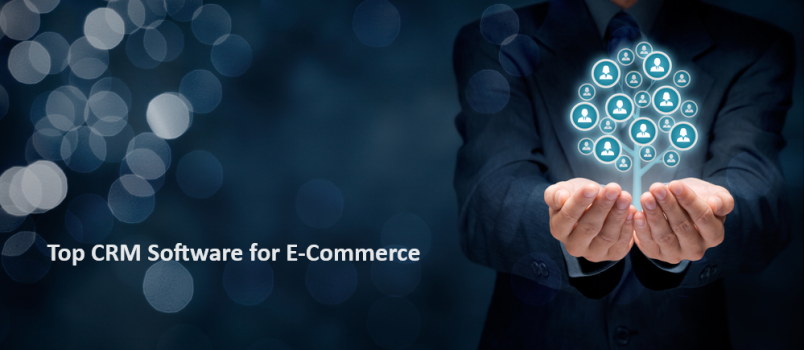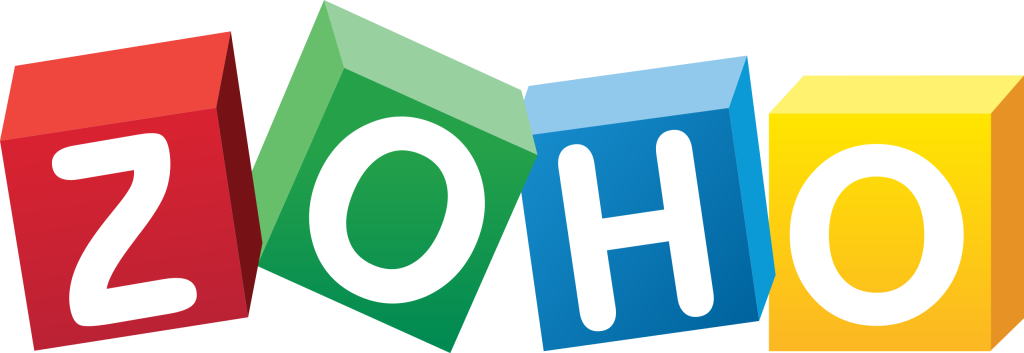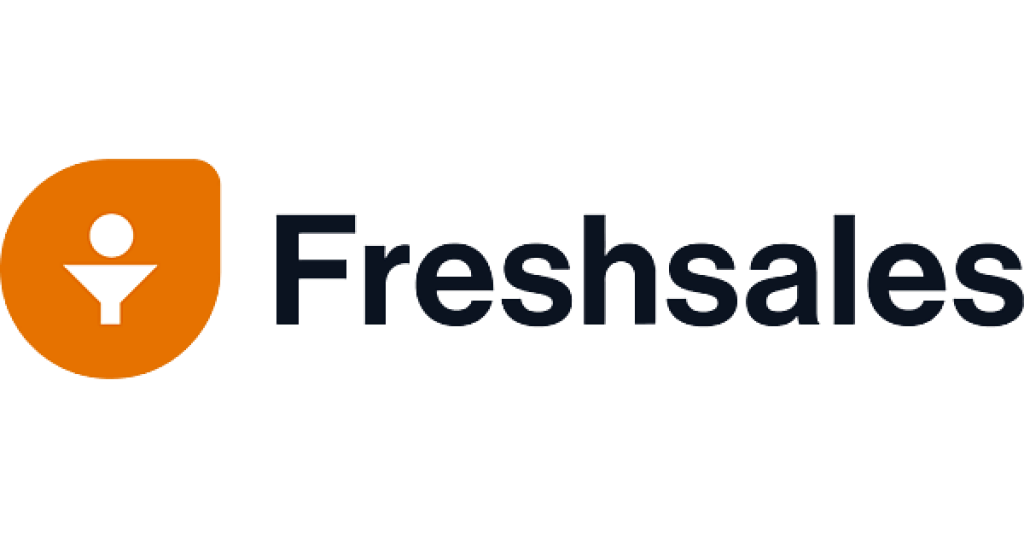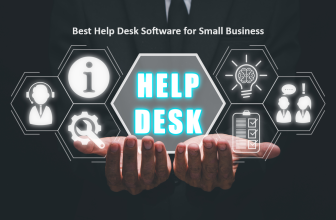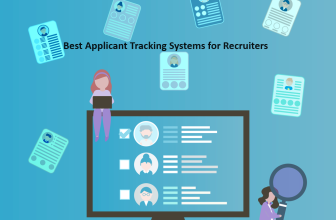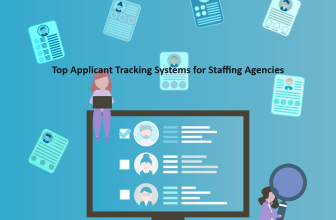When contemplating the adoption of CRM software for an e-commerce platform, factors such as integration capabilities with existing e-commerce infrastructure, ease of use, and the ability to scale as the business grows are crucial. CRM for e-commerce often includes features such as customer data management, personalized marketing, automated workflows, and customer service tracking. Each of these features aims to compile customer data into a single, coherent system that enables personalized communication and service.
A standout CRM solution can provide actionable insights and analytics, thus empowering e-commerce businesses to make data-informed decisions that enhance the customer experience. The appropriate software fosters a seamless interaction between the sales, marketing, and customer service teams, creating a unified approach to customer engagement that is as efficient as it is effective.
What we cover
What Are the Benefits of Using CRM Software for E-Commerce
E-commerce businesses can leverage CRM software to optimize various operational facets, from marketing strategies to customer support. These tools are instrumental in handling vast amounts of customer data, thus facilitating a more personalized shopping experience.
- Centralized Customer Data: CRM systems aggregate customer data including contact information, purchase history, and behavior. This centralization enables businesses to create detailed customer profiles, improving the accuracy of targeted marketing efforts and sales strategies.
- Enhanced Segmentation: With access to comprehensive customer data, businesses can segment their audience based on numerous criteria such as demographics, purchase history, and browsing behavior. Such segmentation aids in tailoring marketing campaigns to specific customer groups, increasing their effectiveness.
- Workflow Automation: CRM software streamlines processes by automating tasks such as lead scoring, follow-up emails, and customer support tickets. Automating these workflows not only saves time but also ensures consistency in customer interactions.
- Personalization of Customer Experience: By understanding customer behavior and preferences, e-commerce companies can personalize the shopping experience. Personalization can lead to improved customer satisfaction and loyalty.
- Improved Customer Support: E-commerce CRMs offer tools for managing customer interactions efficiently. Support teams can quickly access a customer’s history and information, which enables them to provide faster and more personalized help.
General Pricing of CRM Software for E-Commerce
When evaluating CRM software for e-commerce, businesses should carefully consider pricing structures, as these can significantly impact the overall budget and value derived from the software. CRM pricing often varies depending on features, user count, and whether the platform is cloud-based or installed on-premises.
Various Pricing Models:
- Monthly subscriptions: These are typically charged per user per month, offering the flexibility to scale up or down as needed.
- Annual commitments: These may provide cost savings in return for a longer-term commitment.
Common Pricing Tiers:
- Entry-level solutions: These may offer free versions with basic CRM capabilities to manage e-commerce needs.
- Mid-range offerings: These often include advanced features suitable for growing businesses and may start from around $30/user/month.
- Premium services: These target larger enterprises with more complex needs and can cost significantly more.
Free E-commerce CRM Options: Some providers offer free CRM versions, appealing to businesses with limited budgets. These free versions may include essential features but typically have limitations in customization, support, and scalability.
Features to Look for in CRM Software for E-Commerce
When selecting CRM software for an e-commerce business, there are critical features to consider that can significantly enhance customer relationship management and streamline sales processes. Here’s a condensed list of top features:
- Lead and Contact Management: Effective CRM solutions offer robust tools for managing leads and contacts. These tools facilitate the tracking of customer interactions, preferences, and purchase history, enabling personalized communication and marketing strategies.
- Email Marketing and Automation: The ability to create, send, and measure the impact of email campaigns directly from the CRM is crucial. Look for platforms that provide customizable email templates and marketing automation that can trigger targeted messages based on customer behavior.
- Sales Pipeline and Sales Automation: A CRM should offer clear visualization of the sales pipeline and automate routine sales tasks. This helps sales teams to focus on closing deals and fosters a more efficient sales process.
- Reporting and Analytics: Accurate reporting and analytics capabilities are essential for monitoring KPIs and making data-driven decisions. Customizable reports should provide insights into sales forecasting, customer behavior, and campaign effectiveness.
- Integrations and Workflow Automations: Seamless integration with other tools such as Shopify, along with automated workflows, can significantly reduce manual labor. Automation streamlines operations from order management to customer support, ensuring a cohesive system that syncs with the sales, marketing, and service departments.
Top Recommendations
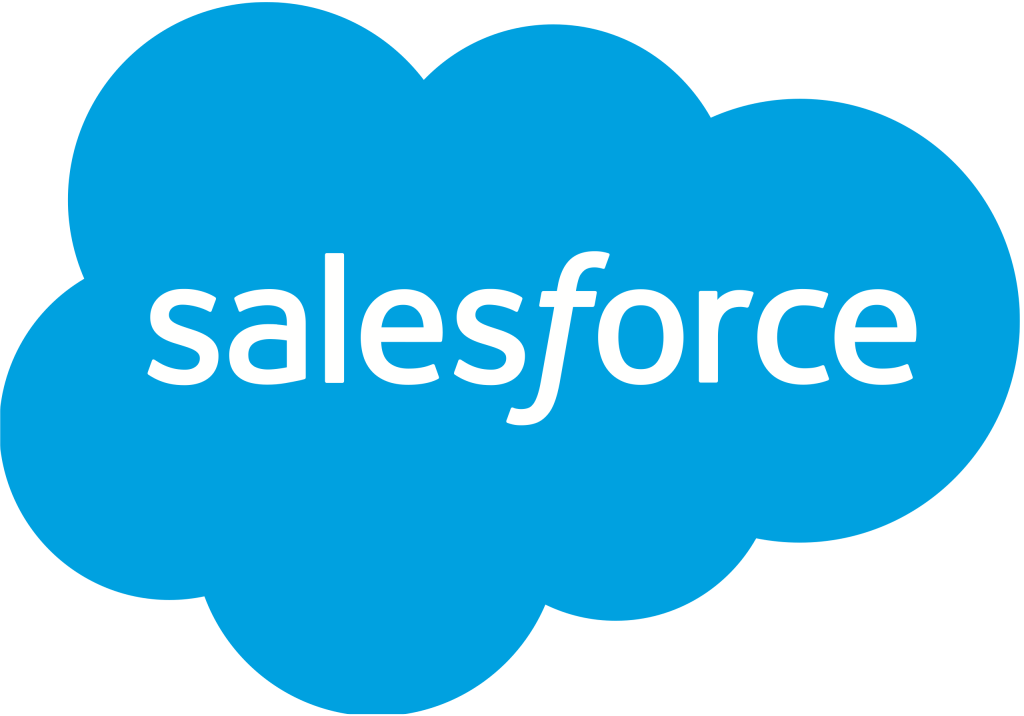
Salesforce is a leading cloud-based CRM platform that empowers businesses to enhance customer relationships and drive growth.

Act! is a popular CRM software designed to help small & medium-sized businesses manage contacts and marketing efforts effectively.
Best CRM Software for E-Commerce
Selecting the right CRM software is crucial for e-commerce businesses looking to enhance customer service, streamline operations, and boost sales. Each CRM offers unique features tailored to the diverse needs of an online store.
Best CRM Software for E-Commerce (At a Glance)
| Software | Focus Area | Key Features | Best For |
|---|---|---|---|
| Salesforce Commerce Cloud | E-commerce and CRM | Unified commerce platform, AI-powered personalization, customer journey management | Large enterprises and complex businesses |
| HubSpot | Inbound marketing and CRM | Marketing automation, sales pipeline management, customer service tools | SMBs to large businesses focusing on inbound marketing |
| Shopify CRM (Shopify Plus) | E-commerce platform | Integrated customer profiles, automation tools, extensive app ecosystem | E-commerce businesses of all sizes |
| Adobe Commerce | E-commerce and CRM | Customizable shopping experiences, inventory management, Adobe integration | Medium to large e-commerce businesses |
| Zoho CRM | CRM | Sales automation, marketing automation, artificial intelligence, analytics | SMBs to medium-sized enterprises |
| Thryv | Small business management | Online appointment booking, social media management, email marketing | Small businesses and local services |
| BigCommerce | E-commerce platform | Seamless integration with CRMs, customizable URLs, robust API | SMBs to large e-commerce platforms |
| Oracle NetSuite | ERP, CRM, and e-commerce | Unified business management suite, real-time analytics, scalable cloud solution | SMBs to large enterprises needing ERP solutions |
| Microsoft Dynamics 365 Commerce | CRM and ERP | Omnichannel commerce, personalized customer engagement, AI-driven insights | Medium to large businesses with complex operations |
| Pipedrive | Sales CRM | Sales pipeline management, activity reminders, customizable pipelines | SMBs focusing on sales management |
| ActiveCampaign | Customer experience automation | Email marketing, automation, CRM, messaging | SMBs to medium-sized businesses focusing on customer experience |
| Keap | Sales and marketing automation | Client management, email marketing, sales automation | Small businesses and entrepreneurs |
| Freshsales | CRM | Lead scoring, email tracking, sales pipeline management, AI-based insights | SMBs to enterprises focusing on sales efficiency |
| SAP Commerce Cloud | E-commerce and CRM | Omnichannel customer experience, product content management, order management | Large enterprises with global operations |
| Agile CRM | CRM, sales, marketing automation | Contact management, marketing automation, telephony, helpdesk | SMBs looking for an affordable CRM solution |
1. Salesforce Commerce Cloud
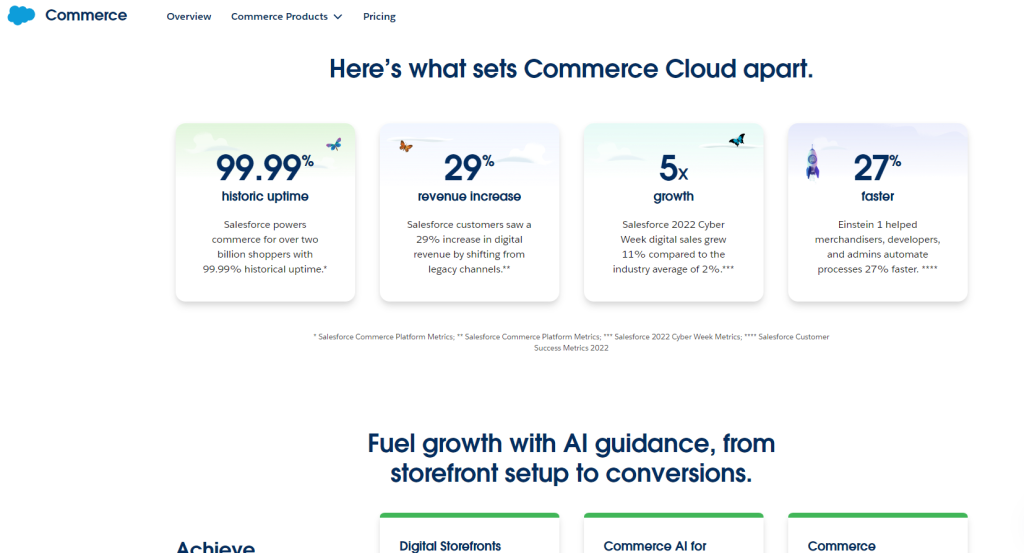
Key Features:
- Unified customer experience across all channels
- AI-powered personalization
- Extensive ecosystem of third-party applications
Rating: 4.5/5
Pros:
- B2B and B2C capabilities on a single platform
- Advanced analytics for tracking customer activity
- Strategic insights to optimize user engagement
Cons:
- Higher cost may not be suitable for small businesses
- Can be complex to implement without technical expertise
- Customization requires in-depth knowledge of the system
Pricing: Custom pricing based on individual business needs.
Salesforce Commerce Cloud is a highly scalable, cloud-based SaaS ecommerce solution that provides a comprehensive suite of features designed to empower businesses to create seamless shopping experiences across all digital channels.
It integrates commerce, marketing, and customer insights into a single platform, leveraging AI with its Einstein feature for personalized customer experiences.
The platform is ideal for large enterprises due to its ability to manage complex commerce operations, global expansion, and multichannel sales strategies.
Its robustness, scalability, and extensive ecosystem of integrations make it a top choice for businesses looking to innovate and grow in the competitive digital commerce space.
Verdict: Salesforce Commerce Cloud stands out with its comprehensive approach, ensuring an interconnected customer journey through its deep capabilities in multi-channel service and sales.
Check out Salesforce Commerce Cloud here!
2. HubSpot
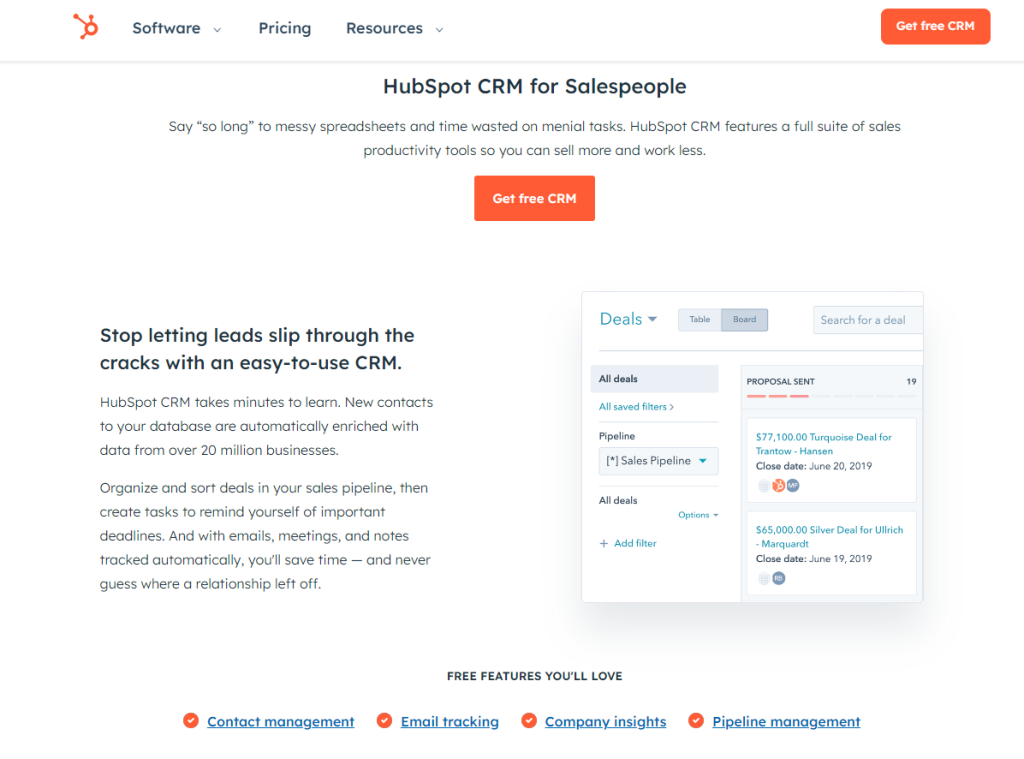
Key Features:
- Robust marketing tools to engage customers
- Comprehensive free CRM plan for beginners
- Easy integration with platforms like Mailchimp and Shopify
Rating: 4.7/5
Pros:
- Intuitive interface promotes usability for non-technical users
- Extensive inbound marketing features
- Free plan suitable for startups and small e-commerce businesses
Cons:
- Limited customization on the free plan
- Costs can grow with add-ons and premium features
- May not be ideal for very large enterprises needing extensive customizations
Pricing: Offers a free plan; paid plans start at $45/month billed annually.
HubSpot is renowned for its inbound marketing capabilities, providing a comprehensive CRM platform that supports businesses in attracting visitors, converting leads, and closing customers.
It offers a full stack of software for marketing, sales, service, and content management, with a focus on automation to streamline operations.
HubSpot’s ease of use, combined with powerful analytics, email marketing, and lead nurturing tools, make it ideal for small to medium-sized businesses aiming to grow their online presence.
The platform’s ability to deliver detailed insights into customer interactions enhances its appeal, facilitating targeted marketing strategies and improved customer engagement.
Verdict: HubSpot is renowned for its user-friendly interface and potent marketing tools, making it a favored choice for e-commerce businesses looking to scale efficiently.
3. Shopify CRM (Shopify Plus)
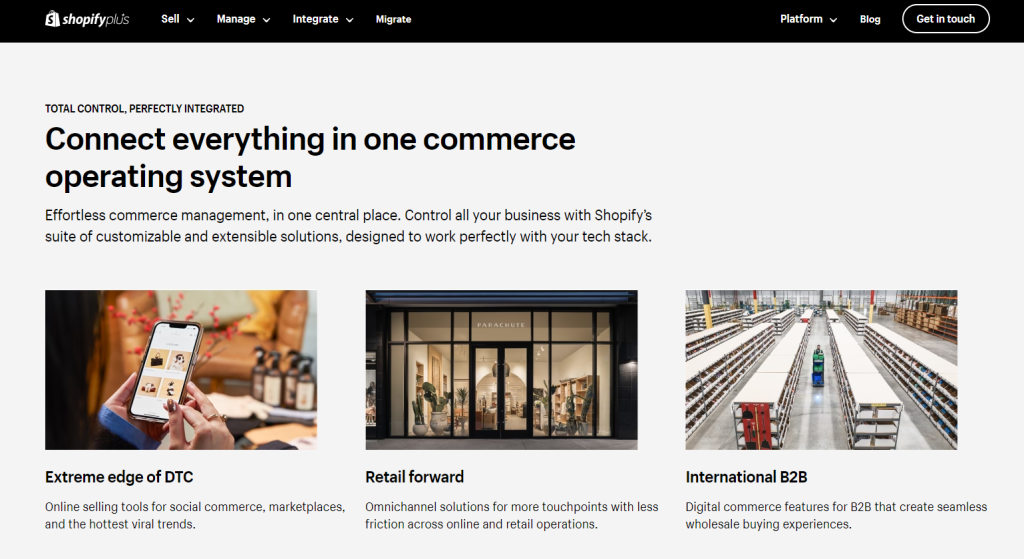
Key Features:
- Seamless integration with the Shopify online store
- Centralized place to manage customer information
- Automation tools for marketing and email campaigns
Rating: 4.4/5
Pros:
- Built-in integration with various third-party tools
- Streamlined operations for e-commerce businesses
- High usability for small to medium-sized stores
Cons:
- Limited CRM features compared to dedicated CRM platforms
- May require additional apps for specialized needs
- Mainly suitable for businesses already on Shopify
Pricing: Shopify Plus starts at around $2,000/month.
Shopify Plus offers an enterprise-level e-commerce solution that brings the reliability and scalability of Shopify’s platform to larger businesses. It provides advanced features such as customizable checkout processes, automated campaign builders, and exclusive APIs for high-volume merchants.
Shopify Plus integrates seamlessly with Shopify’s extensive app ecosystem, allowing for enhanced functionality in areas like marketing, shipping, and inventory management.
Its user-friendly interface and comprehensive support resources make it a preferred choice for businesses looking to expand their online retail operations without compromising on ease of use.
Verdict: Shopify Plus is designed to work in harmony with the Shopify e-commerce platform, offering a straightforward CRM solution focused on sales and customer engagement.
4. Adobe Commerce
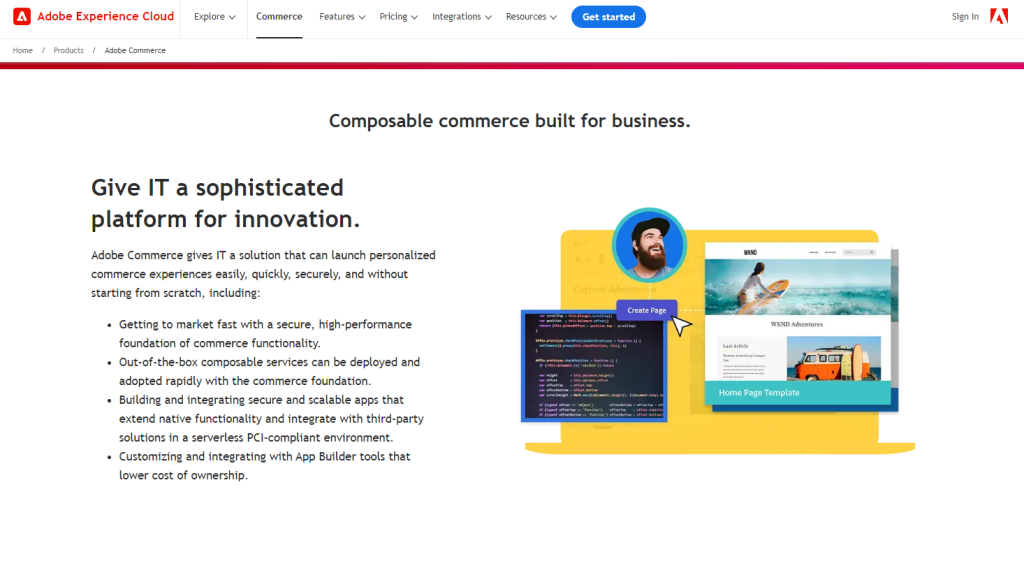
Key Features:
- Open-source platform with flexibility for customization
- Robust content management functionalities
- Personalized shopping experiences based on customer data
Rating: 4.3/5
Pros:
- Highly customizable to fit specific business requirements
- Strong community support with numerous plugins
- Suitable for complex b2b and b2c e-commerce setups
Cons:
- Requires development resources for setup and maintenance
- High level of complexity might be overwhelming for some users
- Can be expensive when scaling up and adding premium features
Pricing: Pricing varies greatly, with a free community version and an enterprise solution negotiable based on requirements.
Adobe Commerce (formerly Magento Commerce), now part of Adobe Experience Cloud, is a leading platform for open commerce innovation. It offers powerful, flexible features that address the full spectrum of commerce needs, from creating engaging customer experiences to managing inventory and shipping.
Its open-source nature allows for extensive customization and scalability, making it suitable for medium to large businesses with complex e-commerce needs.
Adobe Commerce’s global ecosystem of developers and partners, combined with Adobe’s cutting-edge technology, provides businesses with the tools to create unique and compelling online shopping experiences.
Verdict: Adobe Commerce thrives in customizable, scalable e-commerce solutions, perfect for businesses ready to invest in a tailored online shopping experience.
Check out Adobe Commerce here!
5. Zoho CRM
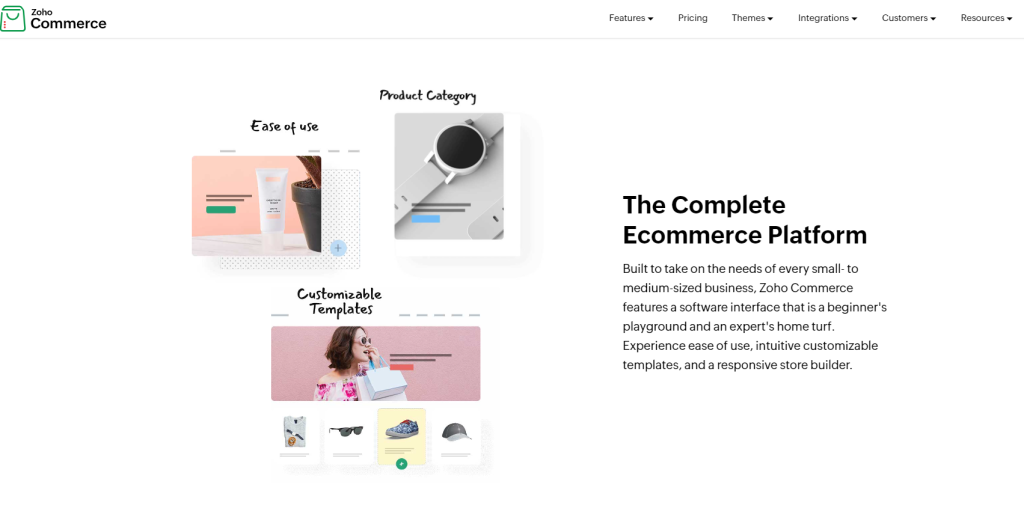
Key Features:
- AI-powered sales assistant
- Multichannel support for customer interactions
- Strong analytics and reporting features
Rating: 4.2/5
Pros:
- Affordable option with a broad range of features
- Integrations available for various e-commerce platforms
- Highly customizable dashboards and reporting tools
Cons:
- The interface may seem cluttered with advanced features
- Mobile app experience may not be as seamless
- Learning curve due to the depth of functionality
Pricing: Offers a free plan; standard plan starts at $14/user/month billed annually.
Zoho CRM provides a comprehensive suite of online productivity tools and SaaS applications. It’s known for its affordability, ease of use, and the ability to cater to businesses of all sizes.
Zoho CRM’s key features include sales automation, marketing automation, and omnichannel communication, allowing businesses to engage with their customers via email, phone, live chat, and social media from within the CRM.
The platform’s flexibility, combined with powerful analytics and customization options, makes it a popular choice for SMBs looking for a robust CRM solution without a significant investment.
Verdict: Zoho CRM is a versatile choice for small to mid-sized e-commerce businesses looking for an affordable yet powerful tool to manage customer relations.
6. Thryv
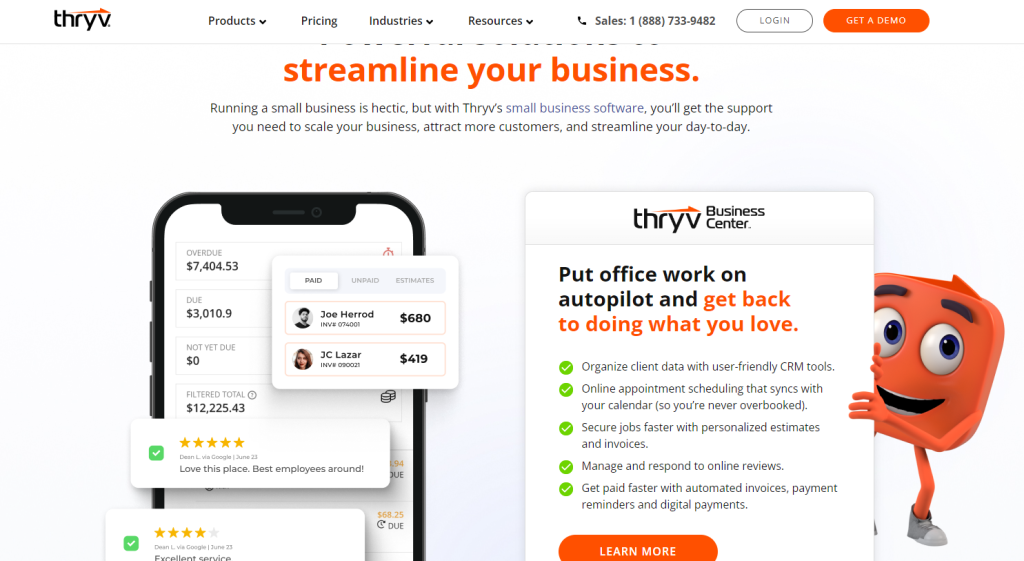
Key Features:
- Easy to use contact and lead management
- Integrated marketing tools for small businesses
- Social media, text, and email communications from a single platform
Rating: 4.0/5
Pros:
- Simple CRM ideal for small businesses
- Centralizes various customer communication channels
- Apps and integrations to streamline operations
Cons:
- May lack advanced features needed by larger companies
- Limited third-party integrations compared to competitors
- Customer support could be improved
Pricing: Specific pricing is not publicly listed; businesses need to get a quote.
Thryv offers an all-in-one management software specifically designed for small business owners. It integrates essential business functions such as customer relationship management, social media management, schedule booking, and payment processing in one platform.
Thryv stands out for its user-friendly interface, mobile app, and automated marketing features, making it easier for small businesses to manage their operations and engage with customers.
Its emphasis on local businesses and service providers, combined with comprehensive support and training resources, makes Thryv a compelling choice for those looking to streamline their administrative tasks and focus on growth.
Verdict: Thryv is an excellent choice for small e-commerce businesses prioritizing simplicity and ease of use in CRM software.
7. BigCommerce
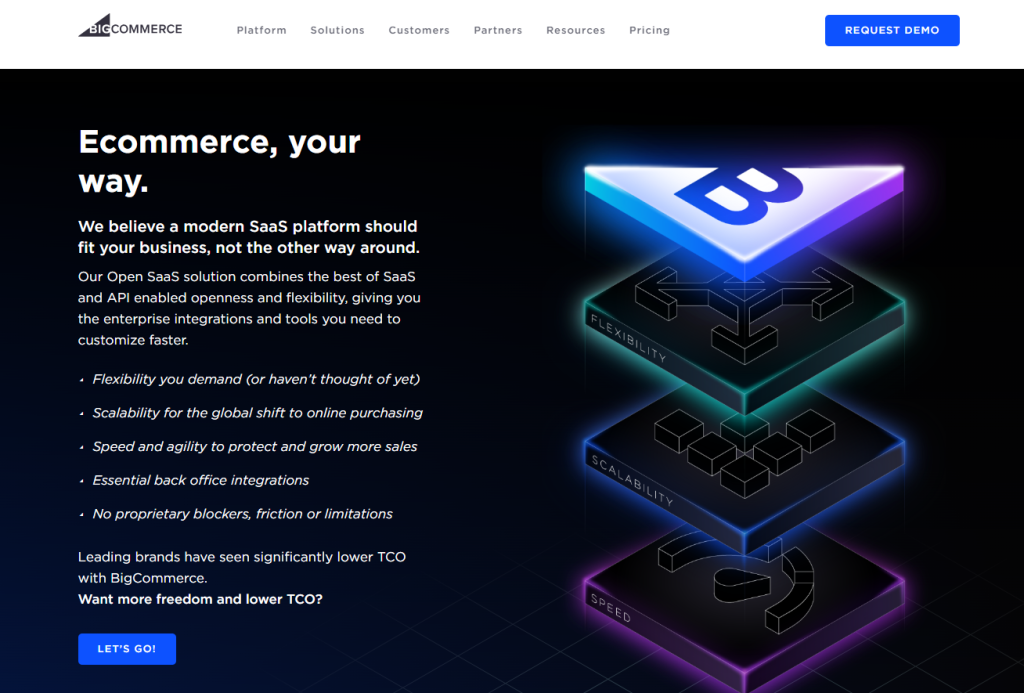
Key Features:
- Native features to support both e-commerce and CRM
- Seamless integrations with email marketing services
- Usable data insights for improving customer interactions
Rating: 4.1/5
Pros:
- No transaction fees and competitive pricing tiers
- Built-in features for managing customer groups and segmentation
- Strong support for multi-channel retailing
Cons:
- Somewhat limited CRM features compared to standalone systems
- Higher level plans required for some advanced features
- Custom development needed for specific use cases
Pricing: Standard plan starts at $29.95/month.
BigCommerce is a leading cloud e-commerce platform for established and rapidly-growing businesses. It combines enterprise functionality with open architecture and app ecosystem, allowing businesses to scale and grow without compromising speed or flexibility.
BigCommerce stands out for its ease of use, customizable templates, and robust SEO features, making it ideal for businesses looking to establish a strong online presence.
Its wide range of built-in features, including multi-channel selling, advanced security, and various payment gateways, provides businesses with the tools they need to create comprehensive online stores that cater to their unique needs.
Verdict: BigCommerce offers a solid e-commerce platform with integrated CRM capabilities, fitting for businesses looking for a dual-purpose solution.
8. Oracle NetSuite
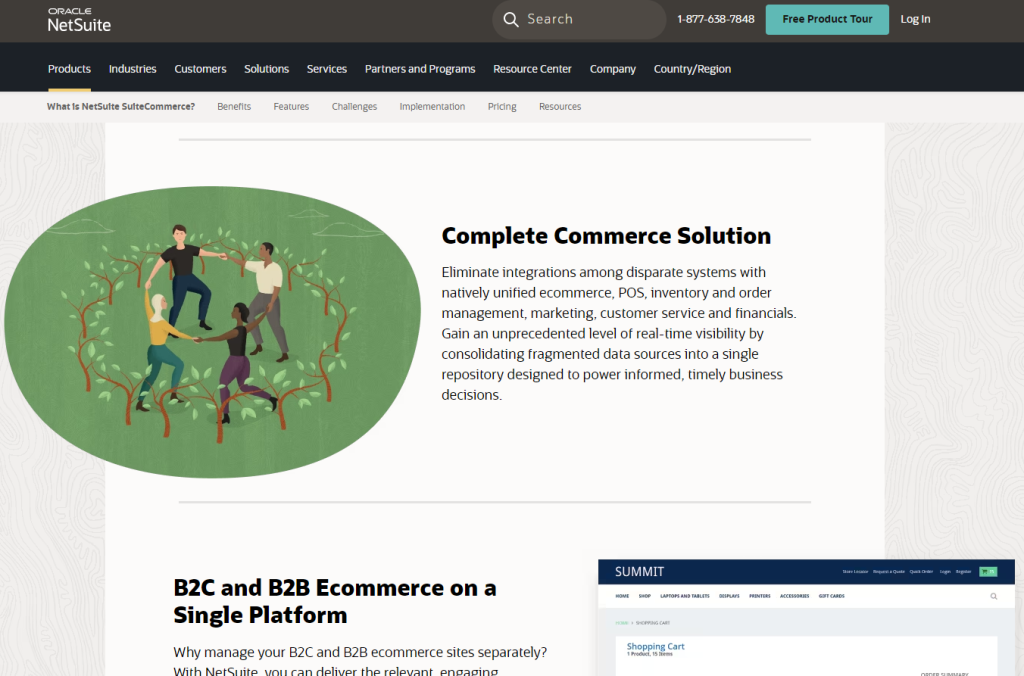
Key Features:
- Comprehensive ERP with built-in CRM functionality
- Real-time data visibility across all business operations
- Extensive customization capability
Rating: 4.6/5
Pros:
- Offers a complete suite for enterprise resource planning and customer management
- Cloud-based solution enabling global access and scalability
- Robust reporting tools for informed decision-making
Cons:
- High total cost of ownership
- Considerable implementation time and effort required
- Occasionally complex for users without technical expertise
Pricing: Customized quote based on business size and specific requirements.
Oracle NetSuite is a comprehensive cloud business management suite that includes ERP, CRM, e-commerce, and inventory management capabilities. It’s designed for businesses of all sizes, offering a unified platform to streamline processes and improve operational efficiency.
NetSuite’s real-time analytics and reporting tools provide businesses with actionable insights into their operations, helping to drive informed decision-making.
Its scalability and extensive customization options make it suitable for businesses looking to grow and adapt in fast-changing markets.
Verdict: Oracle NetSuite is ideal for larger e-commerce operations where CRM is part of a broader suite of business management tools.
Check out Oracle NetSuite here!
9. Microsoft Dynamics 365 Commerce
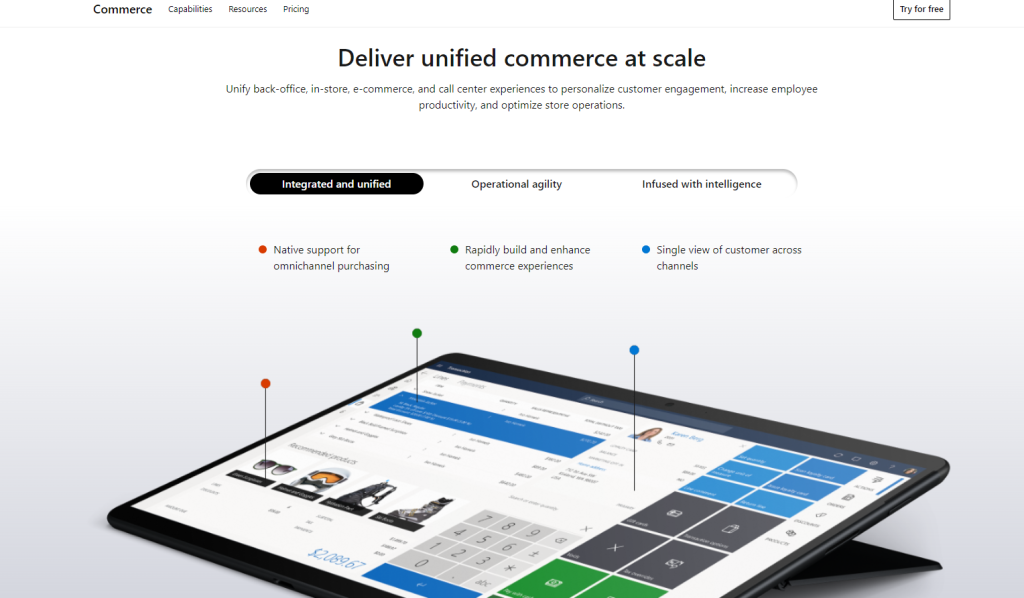
Key Features:
- End-to-end retail and e-commerce management
- AI-driven recommendations and insights
- Omnichannel sales and service capabilities
Rating: 4.5/5
Pros:
- Deep integration with other Microsoft products
- Scalable to the needs of large businesses and enterprises
- Strong support for customer engagement and personalization
Cons:
- Can be cost-prohibitive for smaller businesses
- Complexity requires a knowledgeable team for setup and customization
- Sometimes perceived as overwhelming in functionality
Pricing: Custom pricing structure.
Microsoft Dynamics 365 Commerce provides an omnichannel e-commerce platform that integrates with Microsoft’s suite of business applications, offering comprehensive solutions for retail and e-commerce businesses.
It delivers personalized customer experiences, streamlined operations, and enhanced employee productivity through AI and machine learning capabilities.
Dynamics 365 Commerce is ideal for businesses seeking to unify their back-office, in-store, and digital experiences on a single platform, leveraging the global infrastructure and security of Microsoft.
Verdict: Microsoft Dynamics 365 Commerce stands out for companies deeply invested in the Microsoft ecosystem, looking to leverage AI and personalization at scale.
Check out Microsoft Dynamics 365 Commerce here!
10. Pipedrive
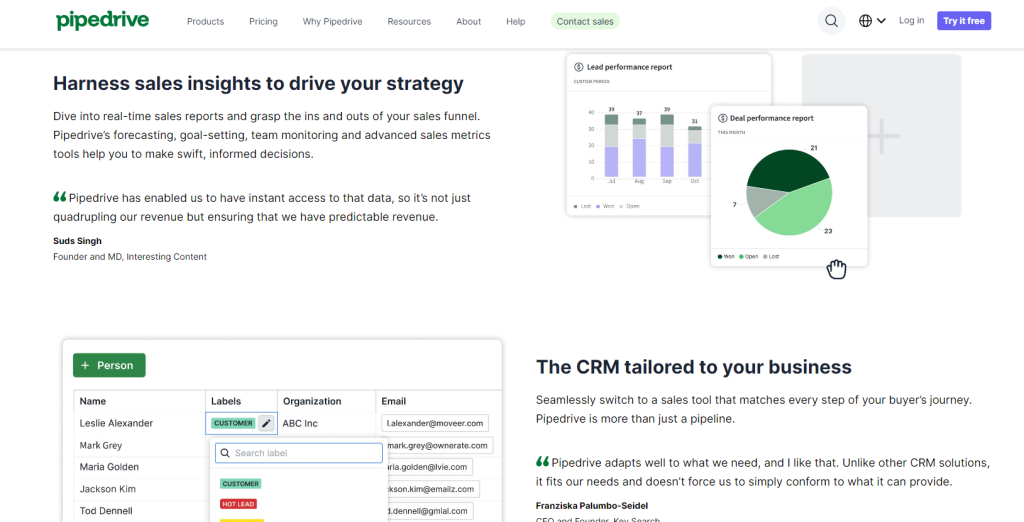
Key Features:
- Visual sales pipeline management
- Email integration with tracking features
- Customizable workflow automation
Rating: 4.4/5
Pros:
- Highly intuitive interface geared towards sales teams
- Affordable pricing compared to other CRM solutions
- Ease of setup and use for small to medium-sized businesses
Cons:
- Lacks some advanced features found in larger CRM platforms
- Limited reporting capabilities without add-ons
- Email sync and scheduling could be improved
Pricing: Essential plan starts at $12.50/user/month billed annually.
Pipedrive is a sales-focused CRM designed to make sales processes more efficient for small to medium-sized businesses. Its intuitive interface and focus on pipeline management help sales teams stay organized and focus on the activities that drive deals to close.
Features like activity reminders, customizable pipelines, and detailed analytics empower sales professionals to track performance and optimize their sales processes.
Pipedrive’s simplicity, combined with powerful sales tools, makes it an excellent choice for businesses looking to streamline their sales operations without the complexity of larger CRMs.
Verdict: Pipedrive excels with its straightforward, visual approach to sales pipeline management, appealing particularly to sales-focused e-commerce businesses.
11. ActiveCampaign
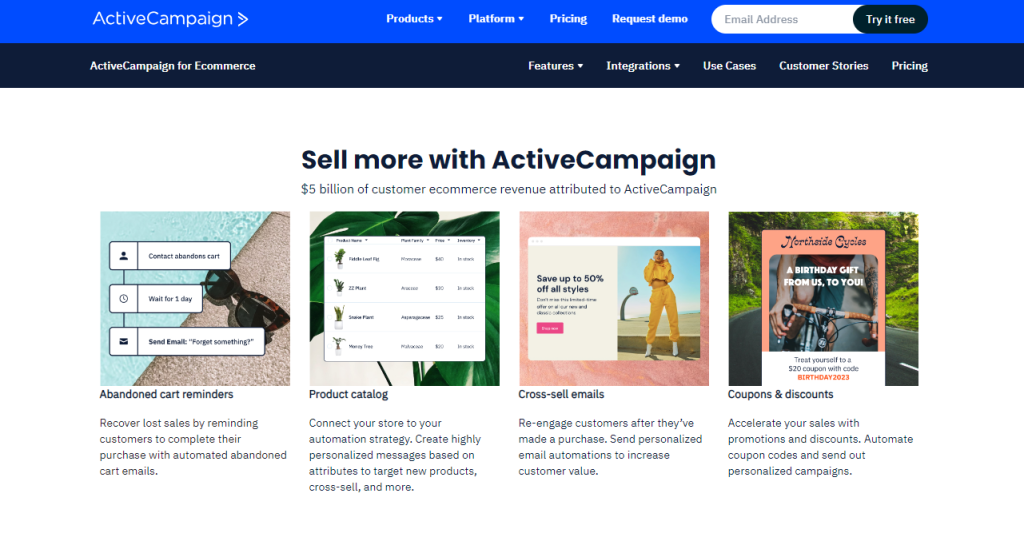
Key Features:
- Advanced email marketing automation
- Extensive customer experience automation
- Insightful lead scoring mechanisms
Rating: 4.3/5
Pros:
- Harnesses the power of automation to nurture leads and customers
- Integrates easily with many third-party e-commerce tools
- Focus on customer journeys and experiences
Cons:
- Could be overwhelming for new users due to complex features
- Reporting can be basic without custom reports
- High level plans can become expensive
Pricing: Starts at $9/month for the Lite plan when billed annually.
ActiveCampaign combines email marketing, automation, sales automation, and CRM for a comprehensive platform that helps businesses of all sizes connect and engage with their customers.
Its strength lies in its advanced automation features, which allow businesses to create personalized customer experiences across all touchpoints.
ActiveCampaign’s detailed segmentation and analytics capabilities enable businesses to tailor their marketing efforts and improve engagement rates, making it ideal for businesses focused on maximizing customer lifetime value.
Verdict: ActiveCampaign is noted for its robust email marketing and automation, which is central to nurturing e-commerce customer relationships.
Check out ActiveCampaign here!
12. Keap
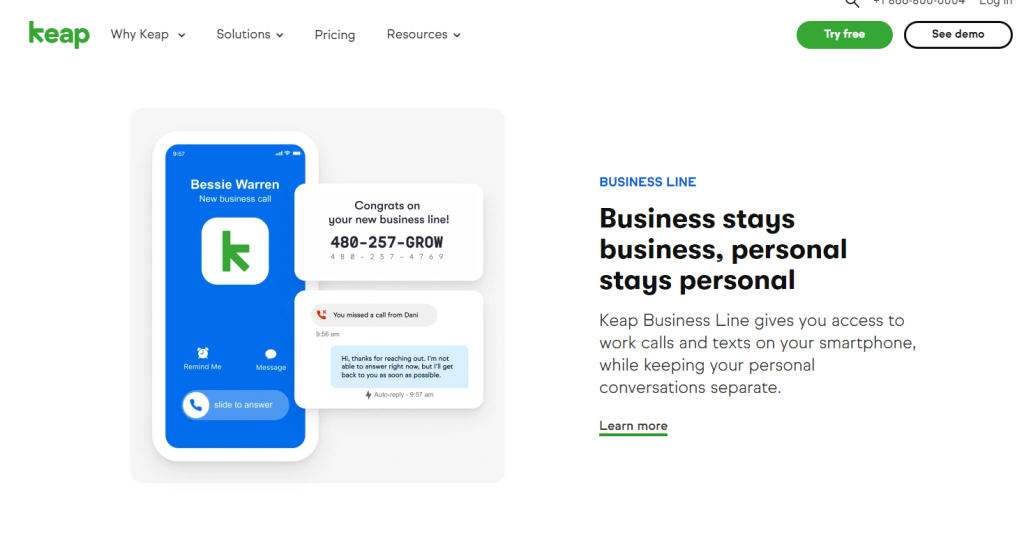
Key Features:
- Integrated sales and marketing tools
- Customer relationship management features
- Automation of daily tasks and workflow
Rating: 4.0/5
Pros:
- Tailored to the needs of small businesses
- Combines CRM with project management features
- Built-in invoicing and payment processing
Cons:
- More expensive than some other options aimed at small businesses
- The interface can take time to navigate effectively
- Some complaints about customer service responsiveness
Pricing: Offers a Lite plan starting at $79/month for up to 500 contacts.
Keap offers a powerful sales and marketing automation platform designed for small businesses. It combines CRM, email marketing, and e-commerce functionalities, enabling businesses to streamline their operations and nurture leads more effectively.
Keap’s robust automation tools help businesses automate repetitive tasks, follow up with leads, and close sales, making it a great choice for entrepreneurs and small businesses looking to grow their customer base and increase sales efficiency.
Verdict: Keap is well-suited for small e-commerce businesses that require CRM with additional sales and marketing functions in one package.
13. Freshsales
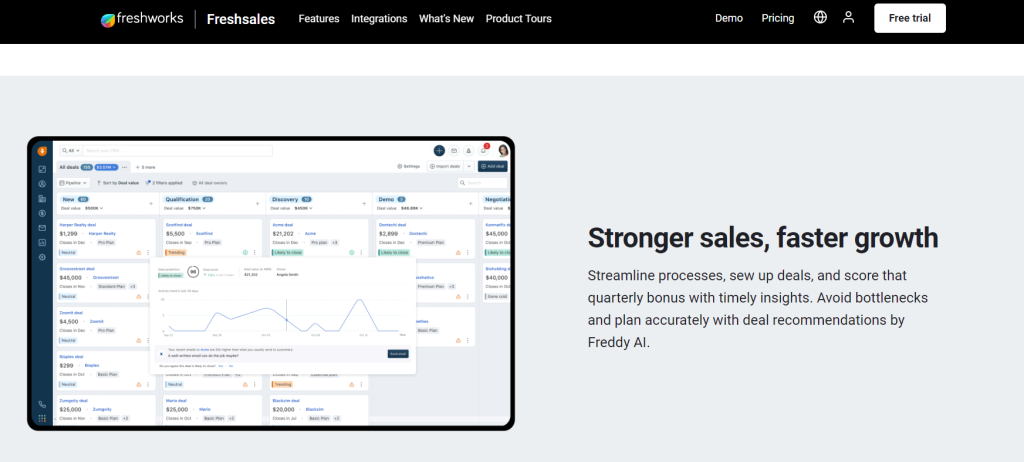
Key Features:
- AI-driven lead scoring
- Visual deal pipeline
- Built-in phone and email
Rating: 4.2/5
Pros:
- User-friendly for sales teams with minimal training
- Offers a feature-rich free tier suitable for startups
- Advanced analytics and reporting features
Cons:
- A finite number of third-party integrations
- Features like multiple sales pipelines are reserved for higher tier plans
- May lack depth in marketing capabilities compared to others
Pricing: Free plan available; growth plan starts at $15/user/month billed annually.
Freshsales is a dynamic CRM solution by Freshworks that caters to businesses of all sizes. It offers sales lead tracking, email integration, direct calling, and sales automation, streamlined within a user-friendly interface.
Its AI-based lead scoring, visual sales pipelines, and insightful analytics help sales teams prioritize leads and deals, enhancing productivity and sales outcomes.
Freshsales is best suited for businesses seeking an all-in-one CRM solution that combines ease of use with powerful sales automation and analytics capabilities.
Verdict: Freshsales excels with its strong AI capabilities and overall ease of use, especially for startups and mid-market companies.
14. SAP Commerce Cloud
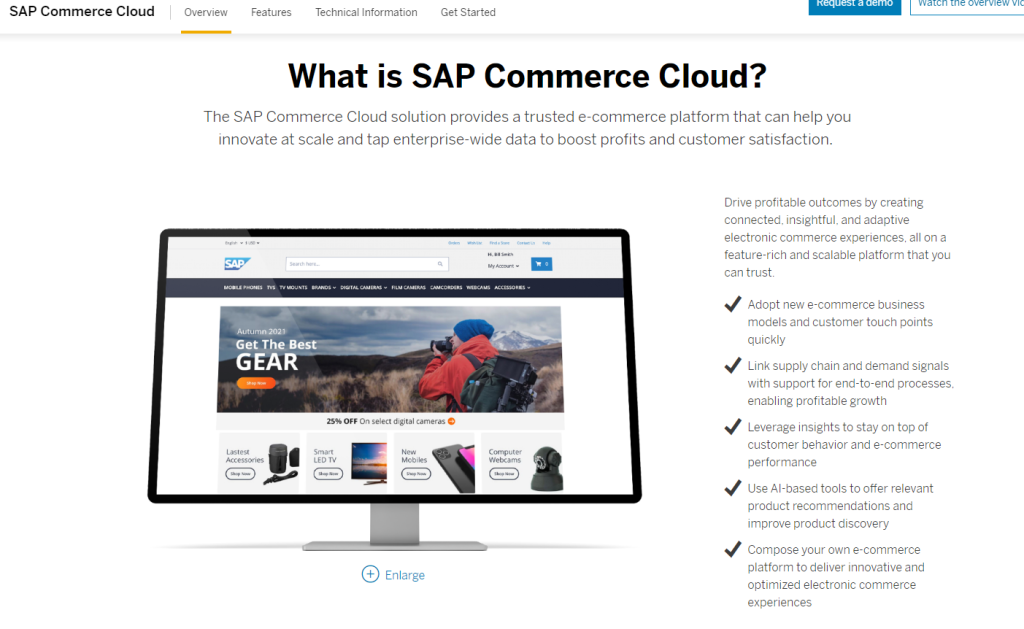
Key Features:
- End-to-end commerce management
- Omnichannel touchpoints for a consistent customer experience
- Flexible and scalable cloud solution
Rating: 4.3/5
Pros:
- Robust feature set for large and growing e-commerce businesses
- Strong focus on customer experience optimization
- Supports complex business models and global operations
Cons:
- May be excessively complex for small businesses
- High cost of ownership including licenses and operations
- Learning curve and resource investment to get the full benefits
Pricing: Custom pricing approach based on business needs.
SAP Commerce Cloud provides a flexible and scalable e-commerce platform designed to support complex business models and global expansion.
It offers robust omnichannel capabilities, product content management, and order management systems, catering to the needs of large enterprises.
SAP Commerce Cloud’s integration with the SAP ecosystem allows for seamless connection with ERP and CRM solutions, providing businesses with a comprehensive view of their operations and customer interactions.
Verdict: SAP Commerce Cloud is a powerhouse for enterprises seeking a fully integrated e-commerce and CRM platform to manage extensive operations and customer interactions.
Check out SAP Commerce Cloud here!
15. Agile CRM
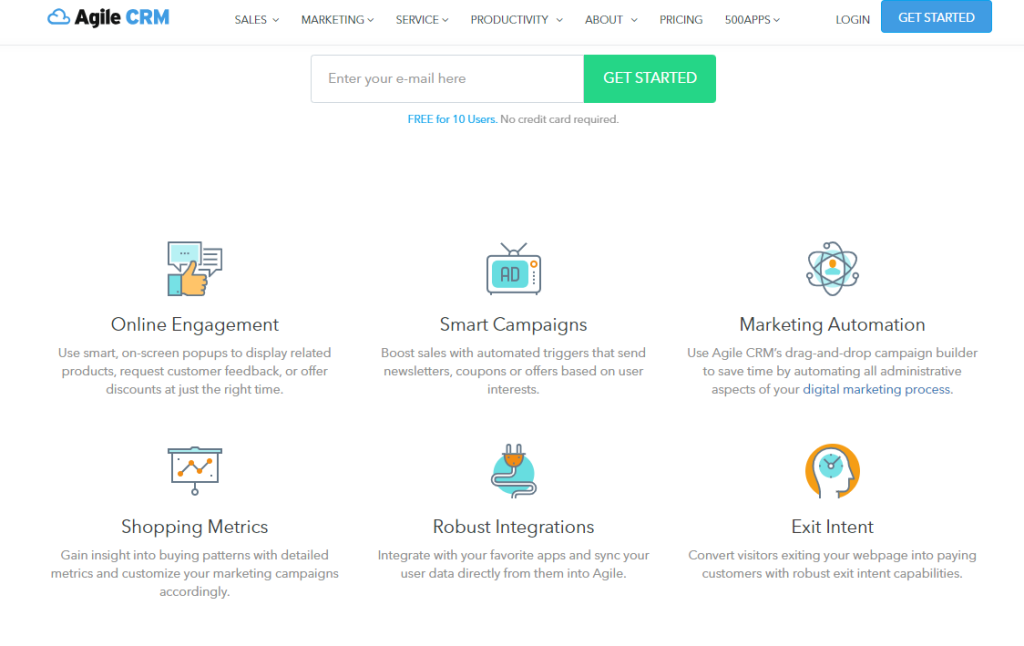
Key Features:
- Sales enablement tools
- Marketing automation suite
- Customer service capabilities
Rating: 3.9/5
Pros:
- Combines sales, marketing, and service in one platform
- Reasonable cost for small to midsize businesses
- User-friendly interface with quick access to customer information
Cons:
- The free version has significant limitations
- Users report occasional glitches and software bugs
- Support response times can be inconsistent
Pricing: Free plan for up to 10 users; paid plans start at $8.99/user/month billed annually.
Agile CRM is an affordable, cloud-based CRM solution designed for small to medium-sized businesses.
It offers sales, marketing, and service automation in a single platform, with features like contact management, marketing automation, web analytics, and telephony.
Agile CRM’s emphasis on usability and affordability, combined with powerful automation tools, makes it an attractive option for businesses looking to enhance their customer engagement and streamline operations without a significant investment.
Verdict: Agile CRM is a strong contender for businesses wanting an all-in-one CRM solution focused on enhancing customer engagement across sales and service sectors.
FAQs
How does integrating a CRM enhance customer experience in e-commerce?
Integrating a CRM system in e-commerce enables businesses to create a personalized shopping experience by tracking and analyzing customer interactions and purchasing history. This data helps in tailoring recommendations, services, and communication, resulting in enhanced customer satisfaction.
How does CRM software typically integrate with e-commerce platforms like Shopify or Magento?
CRM software integrates with e-commerce platforms like Shopify or Magento using APIs or built-in integration tools, enabling seamless data exchange between the systems. This allows for the centralization of customer data, facilitating better tracking of customer behaviors and streamlining marketing efforts.
Can you recommend any open-source CRM solutions that are well-suited for e-commerce?
An example of an open-source CRM solution well-suited for e-commerce is SuiteCRM, which offers flexibility and can be customized to fit the unique needs of an e-commerce business. Its versatility and absence of licensing fees make it an attractive option for small to mid-sized enterprises.
What strategies can be employed to leverage CRM data to boost e-commerce sales?
Businesses can analyze purchasing patterns to implement targeted marketing campaigns and up-sell or cross-sell strategies. They can also use customer feedback and behavior to refine their product offerings and optimize the customer journey for higher conversion rates.

